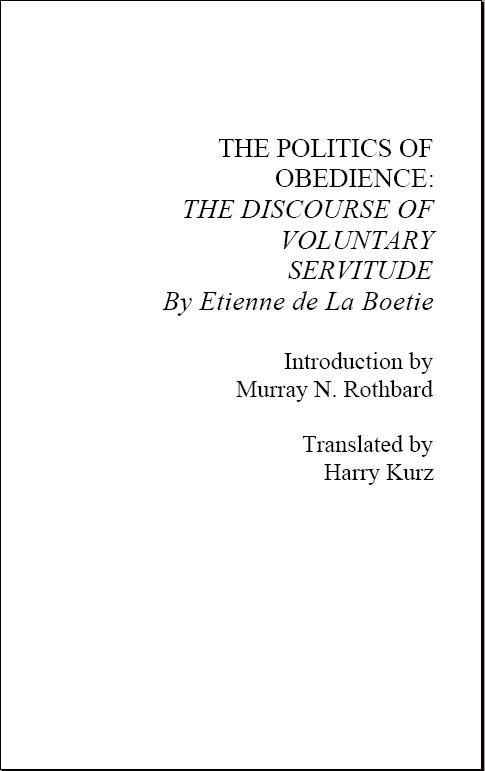
The complete text to the original Etienne de La Boetie's masterwork: The Discourse of Voluntary Servitude can be found Here: http://www.mises.org/rothbard/boetie.pdf
Excerpts:
It is incredible how as soon as a people becomes subject, it promptly falls into such complete forgetfulness of its freedom that it can hardly be roused to the point of regaining it, obeying so easily and so willingly that one is led to say, on beholding such a situation, that this people has not so much lost its liberty as won its enslavement. It is true that in the beginning men submit under constraint and by force; but those who come after them obey without regret and perform willingly what their predecessors had done because they had to. This is why men born under the yoke and then nourished and reared in slavery are content, without further effort, to live in their native circumstance, unaware of any other state or right, and considering as quite natural the condition into which they were born. There is, however, no heir so spendthrift or indifferent that he does not sometimes scan the account books of his father in order to see if he is enjoying all the privileges of his legacy or whether, perchance, his rights and those of his predecessor have not been encroached upon. Nevertheless it is clear enough that the powerful influence of custom is in no respect more compelling than in this, namely, habituation to subjection. It is said that Mithridates trained himself to drink poison. Like him we learn to swallow, and not to find bitter, the venom of servitude. It cannot be denied that nature is influential in shaping us to her will and making us reveal our rich or meager endowment; yet it must be admitted that she has less power over us than custom, for the reason that native endowment, no matter how good, is dissipated unless encouraged, whereas environment always shapes us in its own way, whatever that may be, in spite of nature's gifts. …
…I am of the opinion that one should pity those who, at birth, arrive with the yoke upon their necks. We should exonerate and forgive them, since they have not seen even the shadow of liberty, and, being quite unaware of it, cannot perceive the evil endured through their own slavery. It is truly the nature of man to be free and to wish to be so, yet his character is such that he instinctively follows the tendencies that his training gives him.
Let us therefore admit that all those things to which he is trained and accustomed seem natural to man and that only that is truly native to him which he receives with his primitive, untrained individuality. Thus custom becomes the first reason for voluntary servitude. Men are like handsome racehorses who first bite the bit and later like it, and rearing under the saddle a while soon learn to enjoy displaying their harness and prance proudly beneath their trappings. Similarly men will grow accustomed to the idea that they have always been in subjection, that their fathers lived in the same way; they will think that they are obliged to suffer this evil, and will persuade themselves by example and imitation of others, finally investing those who order them around with proprietary rights, based on the idea that it has always been that way.
There are always a few, better endowed than others, who feel the weight of the yoke and cannot restrain themselves from attempting to shake it off: these are the men who never become tamed under subjection. These are in fact the men who, possessed of clear minds and far-sighted spirit, are not satisfied, like the brutish mass, to see only what is at their feet, but rather look about them, behind and before, and even recall the things of the past in order to judge those of the future, and compare both with their present condition. These are the ones who, having good minds of their own, have further trained them by study and learning. Even if liberty had entirely perished from the earth, such men would invent it. For them slavery has no satisfactions, no matter how well disguised.

